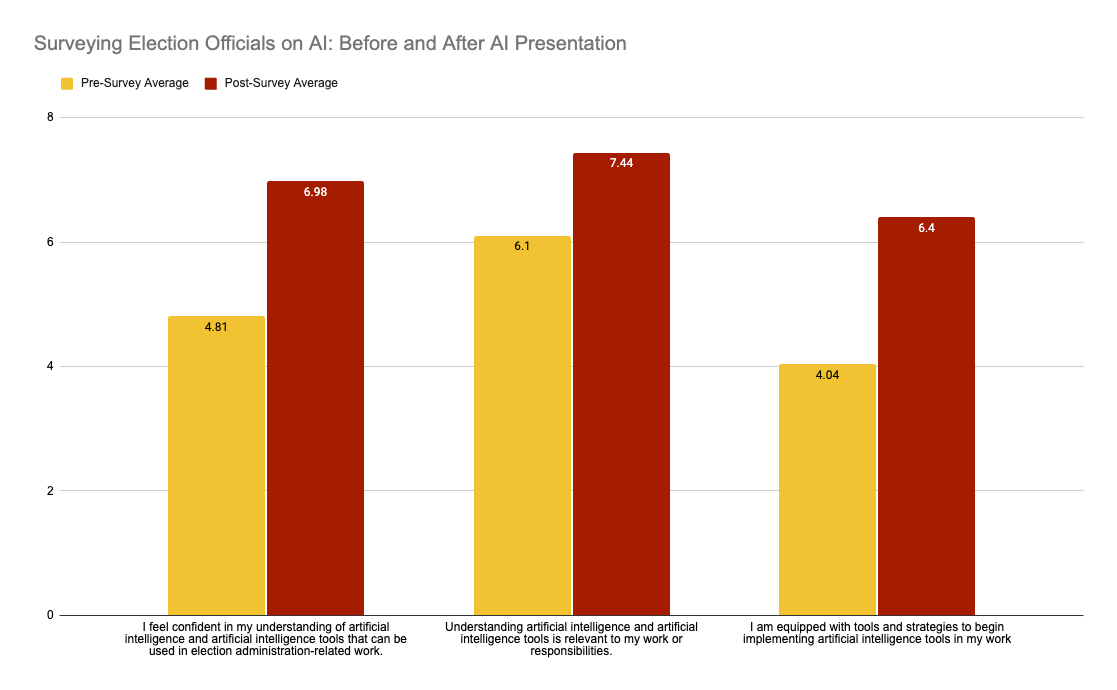Learning Curve: Understanding and Informing How Election Officials Are Approaching AI
Welcome to the ASU AI & Elections Clinic’s newsletter!
Depending on whom you ask, artificial intelligence is either the magic fix for every election problem or the source of a whole new set of headaches. Our newsletter won’t promise miracles or doom, but it will give you a front-row seat to the conversation. Here, we’ll help election officials make sense of both the opportunities and the challenges that AI brings.
Housed in Arizona State University’s Mechanics of Democracy Laboratory (MODL) and partnered with The Elections Group, the ASU AI & Elections Clinic was developed in line with recommendations from the Arizona Secretary of State’s AI and Election Security Advisory Committee, and is designed to be the place that tracks, nudges, slows, and shows how artificial intelligence and elections interact in the years ahead.
The rise of AI-enabled tools is already reshaping election administration. From familiar platforms like Microsoft Office and Google Workspace quietly adding AI features, to new products marketed specifically for election offices, election administrators are facing new choices every day.
But AI doesn’t exist in a vacuum. Its spread brings with it broader philosophical, ethical and environmental questions – from the impact of training large models on climate to debates about the future of human work itself.
Additionally, bad actors are using off-the-shelf systems to generate convincing material meant to deceive people quickly and at scale.
Through this effort, we aim to position election administrators as thoughtful stewards and guardians of the democratic process. That begins with basic AI literacy – not only knowing how to use these tools responsibly, but also recognizing when they are being misused.
What We’re Hearing and Learning
Since the beginning of the summer, we’ve been talking to election officials about AI. What we’ve found is a wide variety of viewpoints and differing levels of skepticism in understanding and using AI-enabled technologies. Our simple feedback surveys have shown something rather heartening, however. Even small interventions – in this case, an hour-long presentation on the basics of AI with some basic examples of AI at work – lead to respectable self-reported gains in overall understanding and sense of readiness in approaching AI-enabled tools.
The survey presented three statements and asked participants to rank their answers on a scale of 1-10 (with 1 indicating strong disagreement with the statement and 10 indicating strong agreement).
Statement 1: I feel confident in my understanding of artificial intelligence and artificial intelligence tools that can be used in election administration-related work.
Pre-survey average: 4.81
Post-survey average: 6.98
Statement 2: Understanding artificial intelligence and artificial intelligence tools is relevant to my work or responsibilities.
Pre-survey average: 6.10
Post-survey average: 7.44
Statement 3: I am equipped with tools and strategies to begin implementing artificial intelligence tools in my work
Pre-survey average: 4.04
Post-survey average: 6.40
In addition, we ask participants to “describe areas of your office or work where you’re most interested in implementing AI tools.” Answers varied from assisting with communications and public outreach to document creation and proofing to data analysis.
At the same time, it’s important to recognize the hesitancy with which some people are approaching the introduction of AI. Some of what we heard included:
“I am not interested in implementing AI tools in my workplace. Coming from a creative industry and having a spouse in data analysis, I would rather not implement something that could threaten my future pay or employment.”
“I do not intend to implement AI tools in my workplace, in my everyday life, or in general.”
“Our office doesn’t promote the use of AI due to the environmental implications and water usage. Thank you for being able to share space for critical comments.”
We are going to aim to publish this newsletter monthly, and we already have a set of webinars we will begin advertising soon. We look forward to continuing to learn with you.
If you’re interested in sharing ways that you’ve approached AI as an election administrator, reach out. And if you’re interested in having one of us talk to your office or state association about AI, email support@electionsgroup.com.
Bill Gates is the executive director of the Mechanics of Democracy Laboratory (MODL) at Arizona State University. Noah Praetz is the President of The Elections Group. TJ Pyche is The Elections Group’s Director of Partnerships.







